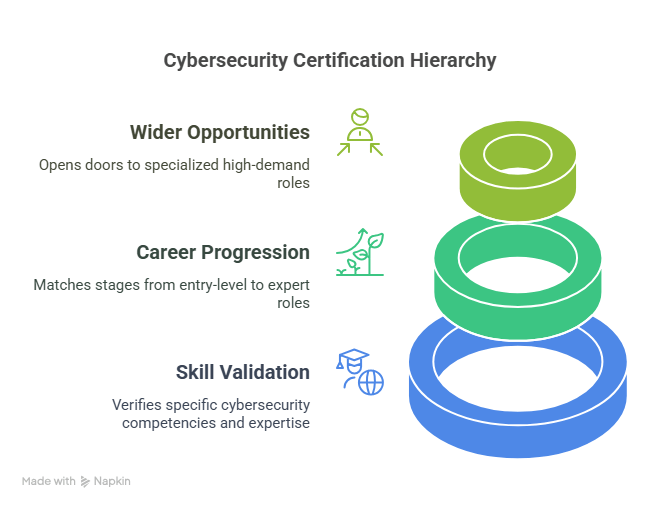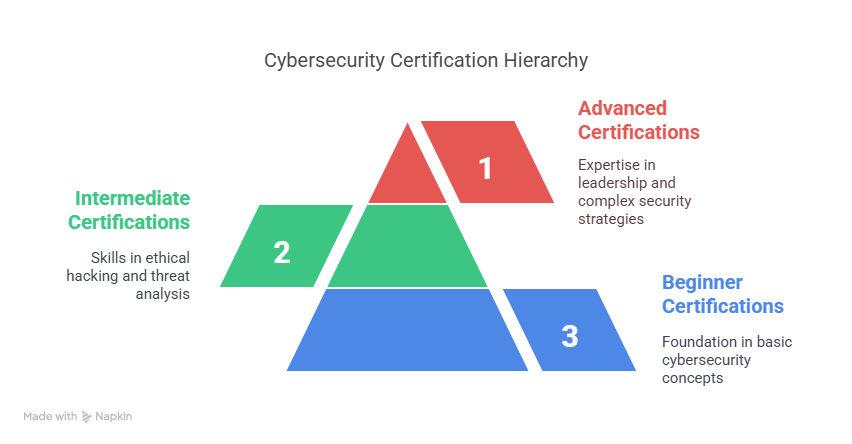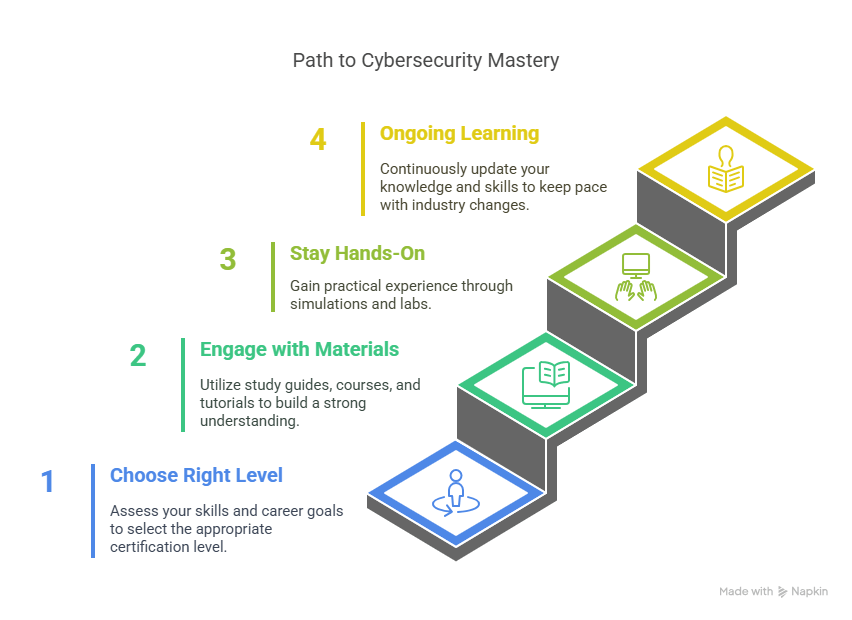Table of Contents
As the world faces an unprecedented rise in cyber threats, the need for skilled cybersecurity professionals has never been greater. To meet the demands of this fast-evolving field, cybersecurity certification levels have become crucial. These certifications are structured to validate your expertise at different stages of your career, from foundational knowledge to expert-level skills. Achieving the right certification level not only enhances your credentials but also helps you specialize in various aspects of cybersecurity. For those looking to further their career, an It Specialist Cybersecurity Certification can be a game-changer.
In this comprehensive guide, we’ll break down the importance of cybersecurity certification levels and explore the certifications you should pursue at each stage of your career. Whether you're a beginner looking to enter the field or a seasoned professional aiming for advanced roles, understanding these levels is essential for navigating your career path.
Why Cybersecurity Certification Levels Are Important
Certifications are not just an addition to your resume; they provide a structured approach to skill development, helping you stay aligned with the ever-changing cybersecurity landscape. Cybersecurity certification levels provide several benefits that can greatly impact your career:

1. Career Progression
Cybersecurity certification levels are designed to match the various stages of a cybersecurity professional's career, ranging from entry-level analysts to expert strategists. This tiered approach ensures that professionals can progressively build on their skills and qualifications as they advance in their careers. Each level corresponds to the increasing complexity and responsibilities in the cybersecurity field, allowing individuals to target roles that best fit their expertise.
As your skills deepen, you’ll be eligible for more specialized and higher-paying positions, such as a Cybersecurity Consultant or Chief Information Security Officer (CISO). Certifications act as benchmarks that demonstrate your growth and expertise to employers, ensuring that you continue to evolve as the cybersecurity field does.
2. Skill Validation
Certification levels are designed to verify a specific set of competencies. For instance, entry-level certifications validate knowledge in network security, while intermediate and advanced certifications validate expertise in complex areas like penetration testing, risk management, and forensic investigations.
Each level ensures that professionals are well-versed in the critical skills needed to protect organizations from cyber threats. As a result, you not only gain credibility but also ensure that your skills are recognized and trusted by employers globally.
3. Wider Opportunities
Achieving a cybersecurity certification opens doors to various specialized roles. Whether you want to become an Ethical Hacker, Security Architect, or CISO, specialized certifications provide the qualifications necessary to enter and succeed in these high-demand positions. As the demand for skilled cybersecurity professionals continues to grow, certifications can be the differentiator that sets you apart from other candidates in the job market.
Understanding Cybersecurity Certification Levels
Cybersecurity certification levels are generally divided into three stages: Beginner, Intermediate, and Advanced. Each stage targets specific skills, career paths, and experience levels. Let’s take a closer look at each level and explore the best certifications you should pursue.

Level 1: Beginner Certifications
Beginner certifications are designed for individuals who are new to the field of cybersecurity. These certifications focus on building foundational knowledge and introducing core cybersecurity concepts. They help you understand basic terminology, security principles, and tools necessary for securing digital assets.
Ideal For:
-
Fresh graduates
-
IT support staff transitioning to cybersecurity
-
Non-technical professionals looking to switch careers
Focus Areas:
-
Basics of network security
-
Incident handling and response
-
Security compliance and risk management
Popular Certifications:
-
CompTIA Security+
A globally recognized entry-level certification that covers the fundamentals of network management, risk assessment, and security protocols. This certification is ideal for those just starting their cybersecurity journey. -
Certified Cybersecurity Technician (CCT)
Designed for beginners, CCT helps professionals build the skills required for entry-level cybersecurity roles. It covers essential topics such as networking and access control. -
ACSMI Beginner Modules
ACSMI offers a comprehensive beginner-level program, covering the basics of cybersecurity with hands-on simulations to give practical experience in securing networks and handling threats.
At this level, you will gain a solid foundation to move forward in your cybersecurity career, with skills that can be applied immediately in various entry-level roles.
Level 2: Intermediate Certifications
Intermediate certifications are for professionals who have gained hands-on experience in IT or cybersecurity and are looking to deepen their expertise. These certifications focus on more technical areas like penetration testing, vulnerability management, and advanced threat analysis.
Ideal For:
-
Professionals already working in cybersecurity
-
IT professionals looking to specialize in cybersecurity
Focus Areas:
-
Ethical hacking and penetration testing
-
Secure application development
-
Vulnerability management and incident response
Popular Certifications:
-
Certified Ethical Hacker (CEH)
This certification teaches professionals how to think like a hacker and conduct penetration tests to uncover vulnerabilities in systems. CEH is one of the most recognized intermediate certifications and is ideal for those who want to specialize in ethical hacking. -
CompTIA CySA+ (Cybersecurity Analyst)
Focusing on cybersecurity analytics, CySA+ emphasizes proactive defense and intrusion detection, preparing professionals for real-world security monitoring and incident response. -
ACSMI Mid-Level Modules
ACSMI offers more than 400 mid-level modules that cover network forensics, data protection, and incident handling, giving professionals the tools they need to handle complex cybersecurity issues effectively.
These certifications will equip you with the advanced skills required to address more complex threats and security breaches in your role as a cybersecurity specialist.
Level 3: Advanced Certifications
Advanced certifications are designed for seasoned cybersecurity professionals who aim to take on leadership roles or tackle highly specialized aspects of cybersecurity. These certifications focus on advanced penetration testing, risk management, governance, and compliance strategies. They also cover the intricate details of cybersecurity architecture, security protocols, and the latest industry trends.
Ideal For:
-
Experienced professionals aiming for leadership roles
-
Those seeking expertise in advanced cybersecurity topics
Focus Areas:
-
Information governance and security policy development
-
Advanced penetration testing and threat intelligence
-
Organizational-level security strategies and compliance
Popular Certifications:
-
Certified Information Systems Security Professional (CISSP)
CISSP is one of the most prestigious advanced certifications in the cybersecurity field. It is highly regarded for roles in security management and design. CISSP covers a broad range of topics, including network security, risk management, and incident response. -
Certified Information Security Manager (CISM)
CISM is aimed at individuals who want to transition into managerial roles. It focuses on risk analysis, governance, and managing an organization’s security framework. CISM is ideal for those aiming for positions like Security Manager or CISO. -
ACSMI Advanced Modules
ACSMI’s advanced certifications include specialized courses in cloud security, quantum cryptography, and AI in cybersecurity. These certifications are designed for professionals looking to lead cybersecurity teams and manage high-level security strategies in organizations.
These certifications prepare you for high-level responsibilities, where you will oversee security strategies, manage large-scale security systems, and guide organizations through compliance and governance frameworks.
Why ACSMI Offers the Best Certification Pathway
ACSMI has established itself as a pioneer in cybersecurity education by providing a structured certification pathway that covers all levels. Whether you are just starting in cybersecurity or looking to specialize or move into leadership, ACSMI offers tailored programs designed to meet your career needs.
Key ACSMI Features:
-
Over 400 modules across various domains of cybersecurity
-
Real-world case studies to enhance practical learning
-
Tailored solutions for various career stages
-
Industry-recognized certifications to ensure a competitive edge
With ACSMI’s programs, you gain not only theoretical knowledge but also practical experience through real-world simulations and hands-on labs. Their certifications are widely recognized in the industry, ensuring that you stand out in the competitive cybersecurity job market.
Preparing for Cybersecurity Certifications
Proper preparation is essential when pursuing cybersecurity certifications. Here’s how you can ensure success at each level:

1. Choose the Right Level
Start by assessing your current skill set and career goals. If you’re new to cybersecurity, consider beginning with entry-level certifications. If you’re already working in IT, intermediate certifications like CEH or CompTIA CySA+ may be more appropriate. For seasoned professionals aiming for leadership roles, advanced certifications like CISSP or CISM are ideal. Additionally, taking a Cybersecurity Certification Test can help you gauge your preparedness for these certifications and advance your career in cybersecurity.
2. Engage with the Materials
Many certification programs offer study guides, online courses, and video tutorials. These resources help break down complex topics and ensure a thorough understanding of the curriculum. Use a variety of study materials, including mock exams and hands-on labs, to prepare for the certification exams.
3. Stay Hands-On
While theoretical knowledge is essential, practical experience is critical. Look for certifications like ACSMI that offer real-world simulations and practical labs. These experiences allow you to apply the concepts you’ve learned in real-world scenarios, making you better equipped for future challenges.
4. Commit to Ongoing Learning
The field of cybersecurity is constantly evolving, with new threats and technologies emerging regularly. To stay ahead, you must commit to continuous learning. Attend webinars, read industry reports, and regularly update your certifications to ensure your skills remain relevant.
Final Thoughts
Navigating through the right cybersecurity certification levels is crucial for anyone aspiring to build or advance a career in the rapidly growing field of cybersecurity. As the digital landscape continues to evolve, so does the need for professionals who can protect systems, networks, and data from increasingly sophisticated threats. Cybersecu rity certification levels provide a clear path for professionals at all stages of their careers, from entry-level to leadership roles.
By understanding the certification levels, you can make informed decisions about which path to take based on your current skills and career aspirations. Whether you are just starting your journey with foundational certifications or aiming for advanced, specialized roles in leadership, certifications like those offered by ACSMI ensure that you are well-prepared to meet the challenges of the cybersecurity world.
In 2025 and beyond, the demand for certified cybersecurity professionals will continue to grow. So, whether you're looking to enter the field, specialize, or climb the career ladder, pursuing the right cybersecurity certifications is an investment that will pay off in both career advancement and financial reward.
FAQs on Cybersecurity Certification Levels
1. What are cybersecurity certification levels?
Cybersecurity certification levels are categorized into three stages: Beginner, Intermediate, and Advanced. These levels match the skill sets required at different stages of a cybersecurity professional’s career.
2. Which level should a beginner pursue?
Beginners should focus on foundational certifications like CompTIA Security+ or ACSMI’s beginner program, which provide a solid understanding of cybersecurity basics.
3. Does ACSMI offer certification at all levels?
Yes, ACSMI offers certifications for all levels, from foundational courses to advanced, specialized certifications. Their programs are designed to cater to professionals at every stage of their career.
4. Do certifications require coding knowledge?
Entry-level certifications typically don’t require coding skills. However, intermediate and advanced certifications, particularly those focused on ethical hacking, may require proficiency in programming languages like Python or Java.
5. How often should professionals update their certifications?
It’s recommended to update certifications every 2-3 years to stay up-to-date with the latest cybersecurity trends, tools, and threats.

Leave a Reply